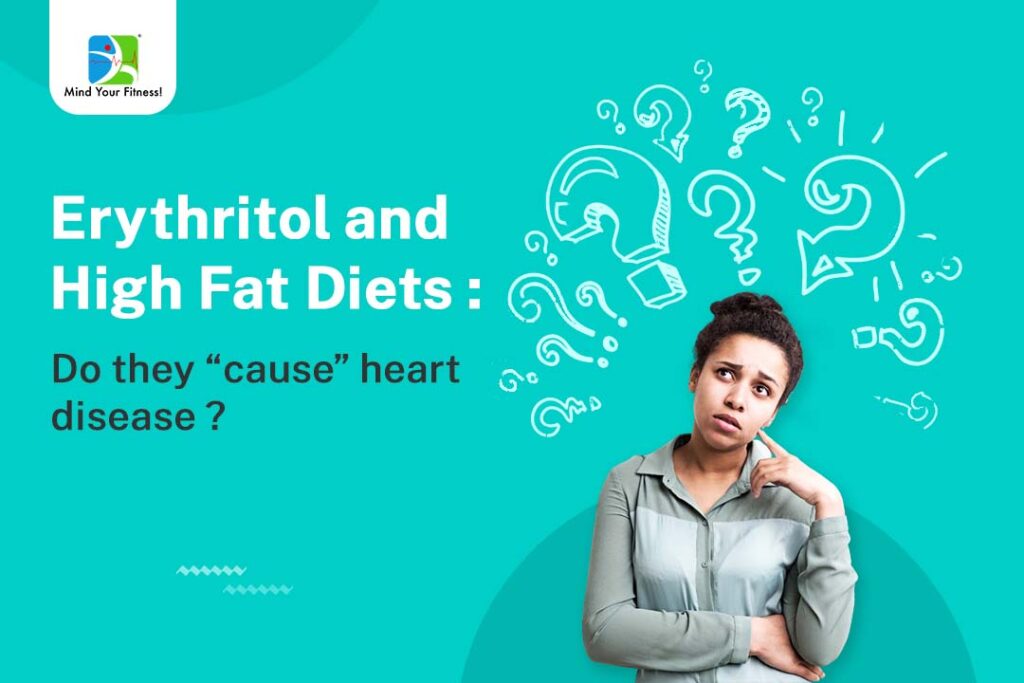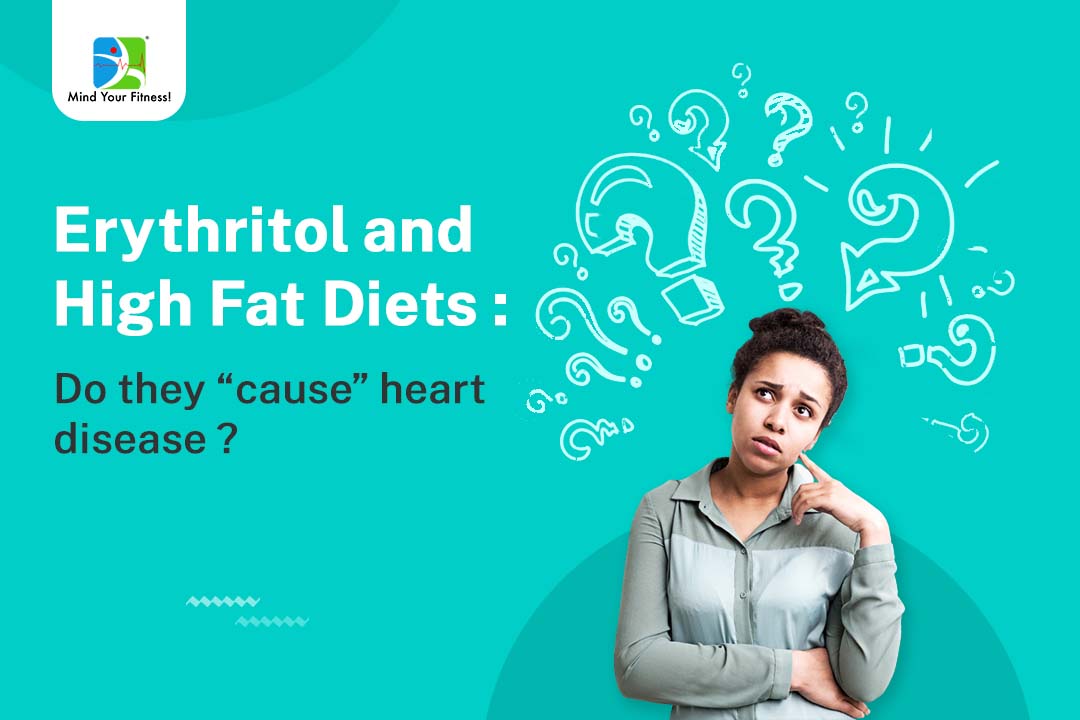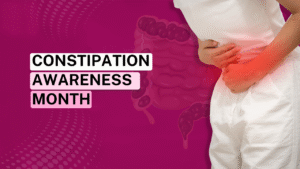
Two articles were reported by the media recently that received much attention regarding their causal association with heart disease.
When studies like these are reported, media thrives on it. Such reporting in the name of public health awareness creates a sense of panic. Even those who are experiencing positive changes in their body fat, blood sugar and lipid levels start doubting if they are doing the right thing.
That’s not how the general public needs to be educated. People only read headlines. No one really reads the conclusion of the study where it clearly mentions at the bottom “it shows an association but does not prove….”
I received frantic calls from clients questioning the validity, from all over the world. That compelled me to deep dive into the articles and here’s my take:
The two articles are:
- “Artificial sweetener” erythritol and cardiovascular event risk published online in Nature Medicine (27th February 2023).
- “Keto-like” Diet Linked to Doubling of Heart Disease Risk, presented at the American College of Cardiology (ACC) Scientific Session/World Congress of Cardiology (WCC) 2023 on March 5th 2023.
Let me break them down for you.
A. Erythritol study:
If you are new to this substance: Erythritol is a sugar alcohol found in nature, meaning that manufacturers do not need to label it as an artificial sweetener. Our bodies make small amounts of erythritol regardless of whether we eat it.
And as far as non nutritive sweeteners go, erythritol has a lot to recommend it. It has shown to improve vascular health in diabetics and also shown to work like an antioxidant. Studies supporting these facts are attached below (1,2).
We can’t get energy out of it; while rapidly absorbed through the small intestine, the vast majority or erythritol is excreted unchanged in the urine with no significant effects on blood sugar and insulin levels.
Why is this study questionable?
- This is an observational study showing an association that those who significantly had higher erythritol levels at baseline would have a major adverse cardiovascular event than those who did not. Just because erythritol levels are higher in people who go on to have heart attacks doesn’t mean that erythritol “causes” the heart attacks. Also, the source of the erythritol ie., dietary, endogenous production (made by the body) was not determined.
- People who consume sugar substitutes may be different in important ways compared with those who don’t; think risk factors like diabetes, obesity. The authors adjusted for many of these, but perfect adjustment is impossible in observational studies.
The authors did show an independent American dataset where those in the highest quartile of erythritol levels (6 to 46 micromolar) were much more likely to have a major heart event in the future.
In a test tube study (in vitro), higher blood levels of erythritol (45 micromolar) were seen to make the platelets clot faster.
Following this, one more study was done in 8 healthy individuals who consumed 30g of erythritol and their levels spiked above 45 micromolar from about 30 minutes to 2 days after consumption.
8 individuals is too small a number to conclude but the point in question is: Do we consume that much erythritol daily or even occasionally in a given day? The study which showed erythritol to improve vascular function in diabetics (2) used about 36g daily for 4 weeks.
While the harms from sugar substitutes are still mostly theoretical, the harms of sugar are real. Erythritol may well be the lesser of two evils here.
Non nutritive sweeteners should be selected based on their minimal ability to raise blood glucose/insulin levels and effects on the gut bacteria. Of these, monkfruit sweetener, erythritol and stevia are relatively better choices compared to sucralose.
If the association to heart disease is real, then we need to figure the safe limits per day for erythritol. Such guidelines have been set for FDA approved artificial sweeteners and is called acceptable daily intake (ADI).
The article also mentioned that some of the erythritol products were “keto”. Isn’t it obvious that a non nutritive sweetener would typically be found in keto/diabetic/weight-watcher friendly food products? We don’t need subtle hints that create more confusion about the safety of ketogenic diets.
Lastly, no one ever claimed that it is an indispensable part of a low carbohydrate diet. However, if low carb dieters want to enjoy an occasional sweet treat, erythritol could be a HEALTHIER alternative to the same amount of sugar.
B. “Keto like” diet study:
Why is this study questionable?
1. This study was also observational, not definitive. It only shows an association but does not prove that high fat diets increase heart disease risk.
2. Researchers analysed data from the UK Biobank, a large-scale prospective database with health information from over half a million people living in the United Kingdom who were followed for at least 10 years. They were overweight, had a higher incidence of diabetes, so their baseline risk was already high to begin with.
3. Participants completed a one-time, self-reported 24-hour diet questionnaire. In my clinical practice, I see clients reporting to be “on keto” which turns out to be that they are not! This is common due to a low level of understanding of the diet, one that is typically downloaded form the Internet. It is always advisable to follow a customised well formulated high fat diet under expert guidance.
4. The LDL increase in the “keto-like” diet group was relatively small to double the risk: 147 mg/dl in the keto-like group vs 141 mg/dL in the standard group. Levels of ApoB were 109 mg/dL in the keto-like group and 104 mg/dL in the standard group.
5. Total cholesterol was found to be higher in the keto group: These diets are known to increase the good cholesterol (HDL) and LDL thus leading to a higher total cholesterol. HDL levels were not reported in the study. Another good to know fact is that saturated fat actually increases HDL.
6. High ApoB is a risk factor indicating more number of small LDL in circulation. Triglyceride levels were also not reported in the study.
We refer to these type of observational studies as hypothesis-generating. It raises a hypothesis but does not prove that a ketogenic diet is harmful.
Diet-Heart Hypothesis: Reducing dietary saturated fat decreases serum cholesterol and the risk of heart disease.
The low-fat “diet– heart hypothesis” has been controversial for nearly 100 years. The low-fat– high-carbohydrate diet, promulgated vigorously by the National Cholesterol Education Program, National Institutes of Health, and American Heart Association since the Lipid Research Clinics-Primary Prevention Program in 1984, and earlier by the U.S.
Department of Agriculture food pyramid, may well have played an unintended role in the current epidemics of obesity, lipid abnormalities, type II diabetes, and metabolic syndromes.
This diet can no longer be defended by appeal to the authority of prestigious medical organizations or by rejecting clinical experience and a growing medical literature suggesting that the much-maligned low-carbohydrate–high-protein diet may have a salutary effect on the epidemics in question. (6).
We have been consciously consuming low fat diets since decades yet the rates of obesity and diabetes are increasing worldwide. Is dietary fat the culprit?
Lipoprotein metabolism: Healthcare professionals keen on understanding why total LDL may not be completely reliable as an independent risk factor should know that LDL has subtypes.
LDL appears as 2 types of particles, small/dense carrying more triglycerides which are risky and large buoyant carrying less triglycerides which are less risky/atherogenic.
Someone with a normal LDL/total cholesterol level still could have a high proportion of small LDL particles, low HDL and higher triglycerides and therefore have a higher risk for heart disease than expected (5).
Overall triglycerides and ApoB tend to be lower on high fat low carb diets as they promote fat burning. I have observed this trend among my clients upon retesting after a 4 week diet trial with or without statins.
However a subgroup of people called “hyperresponders” experience higher levels of ApoB, small LDL and triglycerides on a high fat diet. They need to be identified and monitored.
My high risk patients are assessed for blood lipid changes after following high fat diets for 4-6 weeks. 99% of compliant patients show an improved report from baseline.
If you are a healthcare professional, please go through the references attached below (3,4) for a better understanding of lipoproteins.
Takeaway:
Media needs to be mindful when reporting. As healthcare professionals, we must thoroughly check facts and filter what needs to be considered seriously. We must also do our bit in explaining the difference between real studies and sensational headlines to our patients and clients.
References:
1. Erythritol is a sweet antioxidant.
Nutrition, 2010 Apr;26(4):449-58.
2. Effects of Erythritol on Endothelial Function in Patients with Type 2 Diabetes Mellitus – A Pilot Study.
Acta Diabetol. 2014 Jun; 51(3): 513–516.
3. Small Dense Low-Density Lipoprotein as Biomarker for Atherosclerotic Diseases.
Oxid Med Cell Longev. 2017; 2017: 1273042.
4. Apolipoprotein B and Cardiovascular Disease: Biomarker and Potential Therapeutic Target.
Metabolites. 2021 Oct; 11(10): 690.
5. Triglycerides and Atherosclerotic Cardiovascular Disease.
Journal of The Association of Physicians in India (Volume 68).
https://www.japi.org/x264c4c4/triglycerides-and-atherosclerotic-cardiovascular-disease
6. The Diet-Heart Hypothesis: A Critique
Journal of the American College of Cardiology, vol 43, No.5, 2004
~Shweta Bhatia, Registered Dietitian (Indian Dietetic Association)





